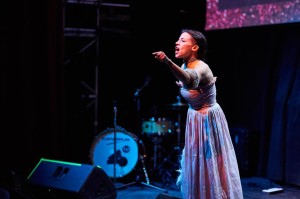
by admin
The Never-Ending Yom Kippur Loop
By Nessa Norich
I was commissioned to create a performance for Lab/Shul’s Storahtelling–a ritual modeled after the ancient practice of reading and interpreting the Torah as it’s being read. My role as a Maven is to relate the Yom Kippur Torah reading, Leviticus 16, to our times. Here is an excerpt from my upcoming Yom Kippur performance.

Photo Credit: Tucker Mitchell
Today, we have the privilege to gather, hundreds of us within the richness and complexity of our community, in order to turn inwardand listen for what needs healing. The Torah reading today, Leviticus 16, reads like an ancient instruction manual for how to atone “for eternity.” We have listened to it for millennia as part of our yearly healing practice.
Today, I am listening for what this chapter has to teach us about healing from an ancient Jewish perspective, because I want to understand how we, as Jews, have learned to heal. I want to take stock of what healing means for us now, with thousands of years of survival behind us. Because what’s the point of showing up, if you don’t really know what you’re doing here?
As a conservative Ashkenazi girl-child in Jersey, this holy day always felt cathartic to me because on Yom Kippur I got to be a good person who also does bad things. On Yom Kippur, I watched the whole congregation transform into a flood of sorrow, in whole-bodied prayer, emotions visible, bellies empty, connected to our guts. This felt very sane.
Today, as an adult, I’ve realized that the whole battling with pain thing is way harder than it looks.
Some wounds dissolve with time or with breath.
And some get lodged, and become part of the body.
Some hurt seems as insurmountable as grief.
As insufferable as shame.
Harder to look at and harder still to lose.
So, what did you bring with you today? And what are you here to do with it?
My grandfather and grandmother were survivors.
I don’t think they had the capacity to process their grief.
They did somehow learn to cope with it.
With family and food and assimilation.
And I think that was crucial to their sanity.
“To cope” comes from a word meaning “to meet in battle”- it is not a weakness.
But this year my grandmother’s grief broke through me.
A bottomless blinding sorrow.
That erupted through my heart like Niagra Falls. In reverse.
as though it had been waiting all 32 years of my life,
until the moment I was ready to listen.
And when I did listen, I felt catastrophic loss in my blood.
And then, I recognized a kind of fear that was also alive in me.
The fear between the shoulders, the fear of the hunted.
I felt a smallness, a readiness to pack my heart in a suitcase and run.
Do you know that fear?
And then I felt I had to make a choice.
To heed that fear as a warning, to take it from my ancestors like an inheritance. To shrink and keep myself invisible
Or to open. To feel the enormity of their loss flow through me, and carve a space wide enough for all of the grief that is equal to the love and equal to the loss – theirs, mine, ours.
When I opened myself to that grief,
more flooded through – sorrow for the border, for the amazon, for the abuses of our government. And in that flood, a rage was ignited. And that rage uncovered a single root – love, with the power of nature herself.
And I hear her, nature herself, cry out in urgency for us to feel!
How is it that greed and corruption and destruction have become so normalized, while our pain remains stigmatized and marginalized?! How is THAT our normal?
There is no transformation without feeling.
There is no greater madness than a never-ending loop.
There is no space to process grief unless we build it – together
And there is no reparation unless we do.
That’s what I heard from her grief.
Nessa Norich is a writer, director, and performer living in Williamsburgh, Brooklyn. Nessa uses live performance and ritual to reimagine the stories that inform the beliefs, values and preconceptions about our reality and our ability to alter it. Her original plays have been performed internationally at the Edinburgh Fringe, Showbox Festival (Norway), British Film Institute, all around New York City and at the New Orleans Fringe. Nessa also directs and acts in film and can be seen on HBO’s High Maintenance. www.NessaNorich.com